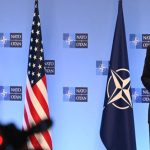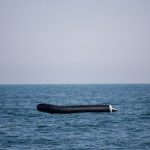With Turkish Russian trade booming since the start of Russia’s invasion of Ukraine, French Foreign Minister Catherine Colonna’s visit to Turkey this week focused on efforts to further isolate Moscow.ADVERTISING
Turkish Foreign Minister Mevlut Cavusoglu welcomed Colonna. But behind the diplomatic pleasantries, there are growing concerns in the EU over Ankara’s refusal to enforce western sanctions against Moscow.
At a joint press conference with Cavusoglu, Colonna stressed the importance of unity in standing up to Russian aggression.
“The European Union and other partner and allied countries have the same objective: to limit the renewal of the Russian war effort and to make Russia understand that it has chosen a dead end,” said Colonna.
“In this context, it is important that as many countries as possible send the same message.
Deep financial ties
Russian-Turkish trade has surged to record levels since the beginning of the Ukraine conflict. Bilateral trade with European countries, which had strong trading ties with Russia, has spiked fuelling suspicions that Turkey is becoming a backdoor to circumvent sanctions.
Turkish-Russian financial ties deepened further, with Moscow depositing five billion dollars in Turkey, ostensibly to aid a Russian company’s construction of a nuclear power station in Turkey.
A further 10 billion dollars is reportedly expected in the next few weeks. The infusion of hard currency is a welcome boost for President Recep Tayyip Erdogan, whose 2023 campaign for reelection is dogged by a plunging lira and inflation running at nearly 80 percent.
“By helping Russia get around sanctions, Turkey can earn key balance of payments receipts, and that will help support the lira, write down inflation and help Erdogan win the elections,” explained Timothy Ash, a senior strategist with Bluebay Asset Management.
‘Black knight’
To safeguard his close ties with Vladimir Putin, Erdogan has resisted calls from his western allies to enforce sanctions against Russia. Last month at the Black Sea resort of Sochi, the two leaders discussed further developing trade ties.
Turkey has doubled Russian oil imports since this year’s assault on Ukraine. Russian oligarchs continue to moor their yachts in Turkish marinas, knowing that Turkish authorities won’t attempt to seize them.
“Turkey has de facto become a black knight. In academic literature, that means a state that is willing to help a sanctioned country, at least to mitigate sanctions,” said Maria Shagina, a specialist on international sanctions at the Institute for Strategic Studies.
“And this is where Russia sees Turkey in that light, that it can come in handy in terms of developing its economic ties against the background of Western companies fleeing the country,” added Shagina.
Grain deal
Turkey and the United Nations have brokered a deal to export Ukrainian grain to world markets, and those export operations are based in Istanbul.
Erdogan claims credit for the agreement, saying it was possible only because of his close ties with Putin, relations which analysts suggest are set to deepen.
“The current Turkish Russian relations have definite bonds with the current war in Ukraine. Ukraine wheat exports is a new chapter for the region, and Turkey plays a quite significant role as an intermediary,” said Russia Turkey expert Zaur Gasimov of Bonn University.
“And also close military cooperation between Ukraine and Turkey and the aspect of Turkey not joining the anti-Russian sanctions, all that results in dynamics of importance for Moscow and for Ankara,” said Gasimov.
Ukraine drone sales
Erdogan routinely points out that along with close ties with Putin, Turkish firms continue to sell military drones to Ukraine, weapons which are proving effective against Russian forces. But this balancing act between Ukraine and Russia raises questions about where the Turkish leader’s loyalties lie.
In a move interpreted as further stoking questions over Erdogan’s loyalties, Putin invited the Turkish leader to this month’s meeting of the Shanghai Cooperation Organisation, a Chinese-Russian-led, Eurasian security grouping.
Galip Dalay, a Russia Turkey expert at the London-based Chatham House, says Putin’s invitation and regular meetings with Erdogan are part of a broader Russian strategy.
“Putin’s telling the international community, ‘actually I am not as isolated as the West wants or portrays me to be’,” said Dalay.
“So, the symbolism of these meetings, including Erdogan potentially joining the Shanghai Cooperation meeting in Uzbekistan, the symbolism is more important than the substance.”
High technology
Analysts warn that Putin may seek to further leverage Erdogan’s relationship and growing financial dependency on Russia to circumvent Western technology sanctions, putting Ankara on a collision course with its allies.
“To me, the game-breaker is high technology,” warned Atilla Yesilada of Global Source Partners, “If I understand it correctly, both in a civilian area and in a military area, Russia is denied high technology that is really hitting their supply lines.
“If Turkish companies are used to import proscribed items to reexport to Russia, that will blow the game open, and Turkey will be sanctioned,” added Yesilada.
In a sign that Turkey’s western allies are losing patience, the US Treasury sent a letter to Turkey this month bluntly warning Turkish businesses of the financial dangers of trading with sanctioned Russian companies.
With Turkey’s economy in a weak state, sanctions could trigger a devastating economic crisis. At the same time, analysts say Erdogan is placing his bets on Russia in the hope that Russian trade and support will revitalise his nation’s economy ahead of next year’s elections.
Dorian Jones
Source: RFI



